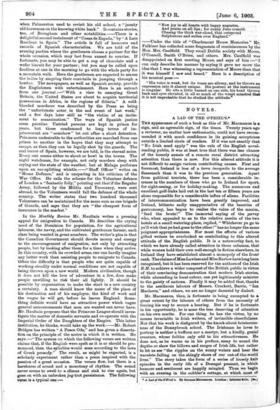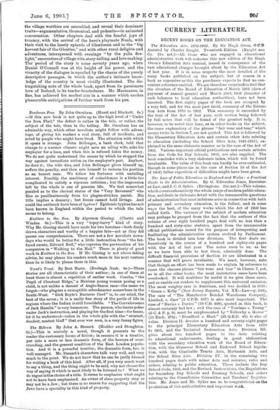NOVELS.
A LAD OF THE O'FEIEL'S.*
THE appearance of such a book as this of Mr. Macmanus is a sign, and an agreeable sign, of the times. Twenty years ago a reviewer, no matter how enthusiastic, could not have recom- mended it with much confidence in its gaining acceptance outside a limited circle of readers. If it was not exactly that " No Irish need apply " was the rule of the English novel- reading public, it was at least true that there was less chance of the homely annals of a remote rural district attracting attention than there is now. For this altered attitude it is not difficult to assign various contributing causes. First and foremost, Ireland is less of a terra incognita to the average Sassenach than it was to the previous generation. Apart from political tourists, there has been a considerable in- crease in the numbers of those who go to Ireland for sport, for sight-seeing, or for holiday-making. The numerous and excellent golf-links laid out in the last ten or fifteen years are alone responsible for a considerable influx of aliens. Facilities of intercommunication have been greatly improved, and Ireland, hitherto sadly unappreciative of the beauties of gastronomy, has begun to realise the value of the maxim, "feed the brute!" The immortal saying of the jarvey who, when appealed to as to the relative merits of the two hotels at a small watering-place, replied, " Whichever ye go to ye'll wish that ye had gone to the other!" has no longer the same poignant appropriateness. Nor must the efforts of various gifted writers be overlooked as contributing to this altered attitude of the English public. It is a noteworthy fact, to which we have already called attention in these columns, that while women hold their own well enough in fiction elsewhere, in Ireland they have established almost a monopoly of the front rank. The claims of Miss Lawless and Miss Barlow have long been recognised, but it has been reserved for the authors of the Irish R.M. to achieve a wider conquest of the British public in virtue of their convincing demonstration that modern Irish stories, while abounding in local colour, can yet legitimately minister to the gaiety of nations. Finally it may be added that, thanks to the assiduous labours of Messrs. Crockett, Barrie, " Ian Maclaren," and others, we are no longer daunted by dialect.
Mr. Macmanus, then, is fortunate in being exempted to a great extent by the labours of others from the necessity of, forcing his way to secure a hearing. But if he is fortunate in his opportunity, he is none the less deserving of attention on his own merits. For one thing. he has the virtue, by no means invariable in Irish writers, of invincible cheerfulness. Not that his work is disfigured by the knock-about boisterous- ness of the Donnybrook school. The Irishman he loves to portray is neither a buffoon nor a martyr, but a kindly, genial creature, whose foibles only add to his attractiveness. He does not, as he warns us in his preface, essay to sound the depths or show the billows and surges of Irish life, but rather to let us see " the ripples on the sunny waters and hear the wavelets falling on the shingly shore of our out-of-the-world lives." The story takes the form of a series of loosely-knit episodes in the early life of a Donegal peasant, in which humour and sentiment are happily mingled Thus we begin with an evening in the cobbler's cottage, at which most of
• A Lod of U. aPrtors. By Seaman Hamann& London : IsbiaterkCo. [66.1
the village worthies are assembled, and reveal their dominant traits—argumentative, thraSonical, and pedantic—in animated conversation. Other chapters deal with the fearful joys of truancy, with the arrival of the hero's playmate Nuala, with their visit to the lonely uplands of Glenboran and to the " big harvest fair of the Glenties," and with other rural delights and adventures, interspersed with evenings " by the yalla fire- light," encounters of village wits, story-telling, and love-making. The period of the story is some seventy years ago, when Daniel O'Connell was at the height of his power, and the vivacity of the dialogue is equalled by the charm of the purely descriptive passages, in which the author's intimate know- ledge of the country is most vividly illustrated. The dis- tinguishing note of the whole book, apart from its passionate love of Ireland, is its tender-heartedness. Mr. Macmanus, in fine, has achieved his modest aim in a manner which excites pleasurable anticipations of further work from his pen.











































 Previous page
Previous page